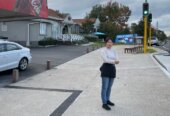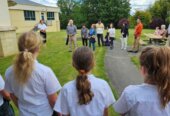
Cambridge U3A founder Carey Church with the group’s first speaker, Cambridge News columnist and international banker, Peter Nicholl.
Cambridge News columnist Peter Nicholl spoke of the complexities of knitting together a fractured Eastern European banking system when he became Cambridge U3A’s opening speaker.
The mid-July gathering was the first held at the group’s new venue, Te Awa Lifecare. Earlier planning meetings were held at the Cambridge Health & Community Centre, but a rapid growth in membership in its initial two months saw organiser Carey Church move swiftly to secure a larger venue.
The group is the first U3A in Cambridge and already includes around 160 members. Speakers will feature at monthly meetings, with smaller interest groups held in between.
Earlier this year, Peter Nicholl received an international award for his work as governor of the Central Bank of Bosnia and Herzegovina. The award was given by the Central Banking Institute for outstanding contribution to capacity building.
Peter grew up and was educated in Cambridge. After spending five years working on the family dairy farm at Fencourt, he studied economics and accounting. He worked with New Zealand’s Reserve Bank for 22 years, five as its chief economist, then deputy governor and deputy chief executive from 1990 to 1995. He moved to Washington for two years, becoming executive director with the World Bank Group; it was towards the end of his tenure there that he was asked whether he’d be interested in becoming governor of a central bank.
“I asked them what bank and they said Bosnia. My response was ‘Mmm, I might have to think about that’. But I liked the idea, so I talked it over with my wife [his economist wife Glynyss Watkins] and we decided to go.”
That was in 1997, two years after the Bosnian War ended. They found themselves in a country facing massive instability, searing hyperinflation and intense distrust. Seventy-six banks served a population of just over four million … there were no ATMs, people had no faith in the system, preferring to keep piles of notes under their mattresses.
Peter’s New Zealand background gave him valuable experience as well as a perceived neutrality that meant he could more easily navigate the difficulties of working with three local vice-governors − one Bosniac, one Croat and one Serb, as well as three local board members, each one also a representative of the three main ethnic groups.
As time passed, Peter succeeded in creating a new stability and managed to push through a much-argued-over design of the new Bosnian currency, which ended up bearing his signature. After six years in the job, the Bosnian presidency granted the couple citizenship in the hopes Peter would remain in the role.
Such an offer was unheard of in banking. He agreed to stay in the role for a further 18 months, during which he trained his successor and helped bed in a sustainable management system.
After leaving Bosnia, they lived in Italy for seven years before returning to New Zealand.








